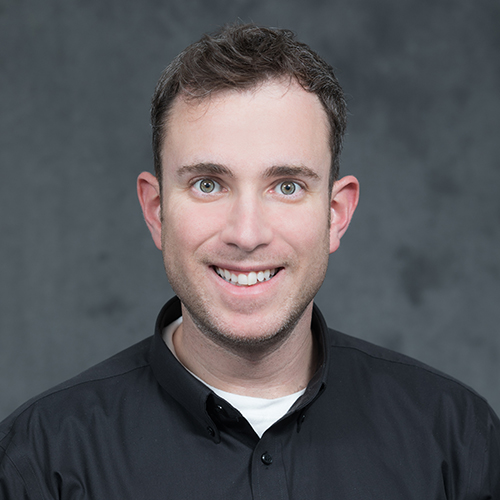Ángel Adames-Corraliza Receives NSF CAREER Award
June 5, 2023
AOS Assistant Professor Ángel Adames-Corraliza has been selected as a recipient of the 2023 National Science Foundation (NSF) CAREER Award. This distinguished grant supports early-career faculty who have the potential to serve as academic role models in research and education and to lead advances in the mission of their department or organization.
From the Caribbean to the Upper Midwest
“Running around the schoolyard and then watching the afternoon clouds get thicker and taller was a typical day in my childhood.”
Growing up in the rural town of San Sebastián, Puerto Rico, Ángel was exposed to a variety of tropical weather, including intense afternoon thunderstorms, easterly waves, holiday troughs, and tropical cyclones. “When you’re a kid you like observing weather because it’s interesting. But one day mom and dad said that if I liked it so much then I should study it. They wanted me to pursue a career that I would enjoy,” says Ángel. Pursuing these interests, he studied physics at the University of Puerto Rico-Maygüez (summa cum laude), taking some coursework in the atmospheric science sequences offered by the department. He later obtained a Phd in Atmospheric Sciences from the University of Washington, did a postdoc at the NOAA Geophysical Fluid Dynamics Laboratory and later became faculty at the University of Michigan prior to moving to the University of Wisconsin–Madison.
Ángel’s research combines his experience growing up in the tropics with his academic background to develop theory that can explain the basic features of tropical phenomena, as well as perform analyses in observations and models to better understand the guiding principles that govern motions in the tropics and how they will respond to a changing climate. For this work, Ángel received the 2018 James R. Holton Junior Scientist Award from the American Geophysical Union, became a 2019 Kavli Fellow of the National Academy of Sciences, and received a 2022 Vilas Early Career Award from UW-Madison.
In addition to his scholarly pursuits, Ángel spends significant time doing outreach, especially with people in Puerto Rico and the rest of Latin America, and has done extensive work helping create a more equitable environment in AOSS. As Ángel mentions, “Interest in understanding the natural world is universal, yet access to it is not. They say knowledge is power, yet most communities live unaware of how much we’ve learned about the weather and climate that affects them. The power of knowledge should be theirs, too. We must work hard to make it so.”
Advancing Research and Education
The grant will support ongoing research on the interactions among water vapor, rainfall, and large-scale circulation patterns in the tropics, and how these will respond to a changing climate. More specifically, Ángel’s lab is trying to understand how tropical waves interact with the Hadley Cell and the associated Intertropical Convergence Zone (ITCZ). So far, they are finding there’s a “tug of war” between these two.
“The scientific community has long thought the tropics export energy to high latitudes mainly through the Hadley Cell,” notes Ángel. However, he also points out tropical waves obtain their fuel by extracting moisture from the ITCZ, which causes the latter to dry up. In doing this, waves are also participating in the poleward transport of energy, a result that has not gotten much attention. Preliminary observational results support this idea, and grant support will allow Ángel to further investigate. If confirmed in analyses, the results would change our understanding of the tropical atmospheric circulation from one in which the Hadley Cell is the only game in town when it comes to energy transport, to one where tropical waves and other weather systems play just as important of a role. This could have major implications in our understanding of the climate system.
Beyond research, the grant will bolster educational initiatives such as the development of a podcast in Spanish titled, “Tiempo, Clima y Tierra”, which Ángel leads together with AOS Assistant Professor Mayra Oyola-Merced. The podcast targets a general audience and covers a range of topics such as tropical waves, El Niño, remote sensing, and mental health. Funds will be used to improve audio and camera equipment and allow for new creative opportunities.
The CAREER award and the possibilities it opens up has created a wave (pun intended) of excitement in AOS. Says Department Chair Ankur Desai, “I am thrilled to learn that Ángel has been awarded the NSF CAREER award, one of the most prestigious early career research awards in the U.S. The award provides support at a crucial time in Ángel’s career, just as many of his ground-breaking theories on tropical convection and circulation are getting noticed in the community. I am excited to see what new results, collaborations, student theses, and outreach will arise out of this work. This achievement among many others of our faculty is reflective of the high caliber of scholarship that comes out of our department.”
What's Next?
Many of the results Ángel’s research group are finding are consistent with results from AOS Professor Larissa Back’s group. Other faculty, like Professor Mayra Oyola-Merced, have found hints of these ideas in their work as well. There are potential opportunities for major collaboration between AOS labs, something Ángel is enthusiastic to participate in.
“People have long thought that the tropics are intractably difficult. Elegant ideas with a lot of explanatory power are emerging, and the community is finally pulling down the curtain of the tropical atmosphere.” Ángel is excited to be a part of this movement, and hopes the results that emerge from the CAREER award help push the envelope further.
